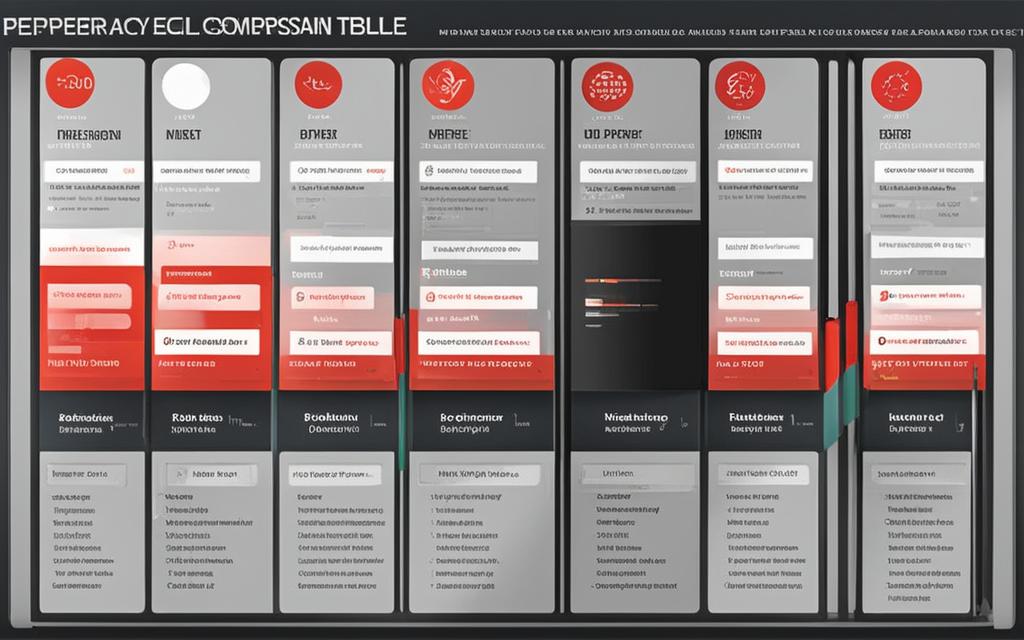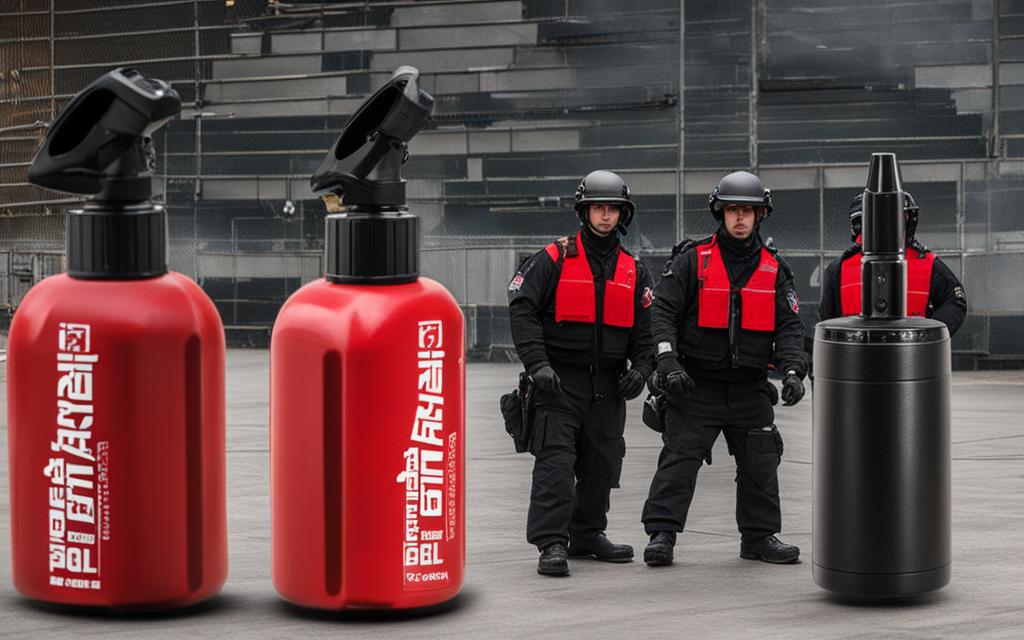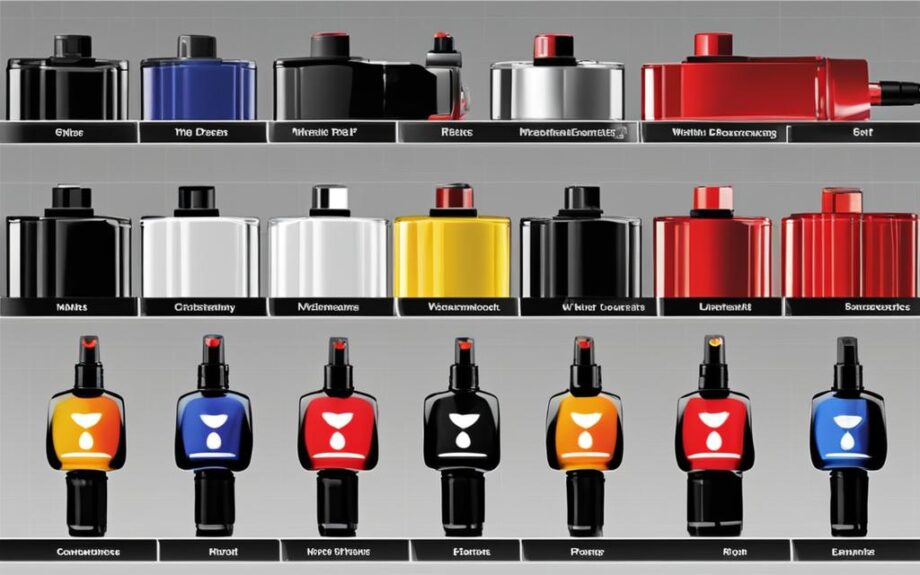As the world becomes increasingly unpredictable, personal safety is a growing concern for many people. When it comes to self-defense options, pepper spray and pepper gel are two of the most popular choices. But which one is the best for personal safety?
In this article, we will explore the debate between pepper spray and pepper gel and determine which self-defense tool is the most effective. We will examine the unique features, benefits, and drawbacks of each option to help readers make an informed decision.
Key Takeaways
- Pepper spray and pepper gel are two of the most popular self-defense options
- Pepper spray is a liquid spray that can irritate an attacker’s eyes, nose, and throat
- Pepper gel is a sticky substance that can adhere to an attacker’s face, reducing the risk of blowback
- Differences between the two options include range, effectiveness, ease of use, and potential side effects
- Choosing between pepper spray and pepper gel depends on personal preferences, specific needs, and legal regulations
Understanding Pepper Spray
Pepper spray is a common self-defense tool used by law enforcement and civilians. It comes in different types and strengths, so it is important to choose the one that suits your specific needs.
Effects of Pepper Spray:
- Temporary blindness: Pepper spray causes a burning sensation in the eyes and temporarily blurs vision, giving the user an opportunity to escape.
- Respiratory issues: Pepper spray irritates the respiratory tract, leading to coughing and difficulty breathing.
- Pain: The burn from pepper spray is intense and can be painful, disorienting the attacker.
How Pepper Spray Works:
“Pepper spray contains oleoresin capsicum (OC), a natural ingredient derived from chili peppers. When sprayed, it causes inflammation of the mucous membranes in the eyes, nose, mouth, and lungs, resulting in temporary discomfort and incapacitation.”
A pepper spray comparison chart can be helpful when deciding which type of pepper spray to buy. Strength, range, and size are important factors to consider. Some types of pepper spray also have extra features, such as UV marking dye, which can help police identify the attacker later.

It is vital to understand the effects of pepper spray and how it works before using it. In the next section, we will introduce pepper gel, a newer alternative to pepper spray, with its unique benefits and features.
Discovering Pepper Gel
While pepper spray has been a popular self-defense tool for many years, pepper gel is a newer, innovative alternative. Pepper gel is similar to pepper spray in that it contains a derivative of cayenne peppers that irritates the eyes, nose, and throat, but it has several unique benefits that make it stand out.
One of the most significant advantages of pepper gel is its ability to adhere to an attacker’s skin, face, or clothing, making it less likely to cause blowback. Additionally, pepper gel typically has a longer range than pepper spray, making it ideal for outdoor use.

Pepper gel also has a better chance of hitting the target accurately. Its gel-like consistency reduces the risk of overspray, making it easier to aim. This precision allows individuals to avoid affecting innocent bystanders accidentally.
How Pepper Gel Works
The primary active ingredient in pepper gel is oleoresin capsicum, or OC, which is a derivative of cayenne peppers. The OC causes inflammation of the mucous membranes in the eyes, nose, and throat, creating intense burning, tearing, and coughing fits. These symptoms can last up to 45 minutes, giving individuals enough time to escape the situation or call for help.
When sprayed, pepper gel adheres to the surface with which it comes into contact, making it challenging for an attacker to wipe off. This stickiness is thanks to the gel’s formula, which includes a mixture of water, oil, and propylene glycol. The stickiness further reduces the possibility of innocent bystanders getting affected by the spray.
“Pepper gel has a more potent and longer-lasting effect than traditional pepper spray. Its unique formula ensures increased accuracy with less chance of leaving a residue in the air. This makes it the better alternative. “
Key Differences between Pepper Spray and Pepper Gel
Pepper spray and pepper gel are both effective self-defense options, each with their own unique features. Understanding the differences between the two can help you make an informed decision about which one is best for your personal safety needs.
Range
Pepper spray typically has a greater range than pepper gel, allowing you to keep a safe distance from an attacker. Pepper spray can usually reach up to 10 feet, while pepper gel usually has a range of 6-8 feet.
Effectiveness
Both pepper spray and pepper gel are effective at incapacitating attackers, but they do so in different ways. Pepper spray creates a mist or stream that can cause temporary blindness, coughing, and difficulty breathing. Pepper gel, on the other hand, sticks to an attacker’s face, reducing the risk of blowback and making it harder to wipe off.
Ease of Use
Pepper spray is easy to use, requiring only a quick press of a button or pull of a trigger to disperse the spray. Pepper gel can be a little more difficult to use, as it requires careful aim to apply to an attacker’s face and clothing.
Potential Side Effects
While both pepper spray and pepper gel are non-lethal, they can cause temporary discomfort, burning, and irritation. Pepper spray can also cause respiratory distress in people with asthma or other breathing difficulties.
| Differences | Pepper Spray | Pepper Gel |
|---|---|---|
| Range | 10 feet | 6-8 feet |
| Effectiveness | Temporary blindness, coughing, and difficulty breathing | Sticks to attacker’s face, reducing risk of blowback |
| Ease of Use | Easy to use with quick press of a button or pull of a trigger | Requires careful aim to apply to attacker’s face and clothing |
| Potential Side Effects | Temporary discomfort, burning, and irritation; respiratory distress in people with breathing difficulties | Temporary discomfort, burning, and irritation |
Deciding between pepper spray and pepper gel ultimately comes down to personal preference and specific needs. If you want to keep a safe distance from an attacker and are comfortable using a spray, pepper spray may be the best option for you. If you’re concerned about blowback and want a product that sticks to an attacker’s face, pepper gel may be the better choice.

Choosing Between Pepper Spray and Pepper Gel
Choosing between pepper spray and pepper gel can be a tough decision. To make an informed choice, there are several factors to consider.
Personal Preferences
Firstly, think about your personal preferences when it comes to self-defense. Do you prefer something small and easily concealed or a larger, more visible defense option? Do you have experience using one over the other, or have a preference based on advice from friends or family?
Specific Needs
Consider your specific needs when it comes to personal safety. If you live in an area with low-lighting, a pepper gel with a built-in LED light may offer added protection. If you are dealing with an aggressive animal, a pepper spray may be more effective at deterring the animal quickly and safely.
Legal Regulations
It’s also essential to research local laws regarding the use of self-defense tools. While pepper spray is legal in most states, some jurisdictions have restrictions on the size and type permitted. Pepper gel may also be subject to separate regulations, so make sure you understand any legal limitations before deciding which option to purchase.
Ultimately, the decision comes down to your personal preferences and specific needs. Remember to factor in legal regulations and conduct thorough research before making your final choice between pepper spray and pepper gel.
Conclusion
After weighing the benefits and drawbacks of pepper spray and pepper gel, it is clear that both can be effective self-defense tools in the right situation. Pepper spray is a more traditional option, with proven results for incapacitating attackers from a distance. However, pepper gel offers unique benefits such as reduced risk of blowback and increased accuracy.
The choice between pepper spray and pepper gel ultimately comes down to personal preference and specific needs. It is important to keep in mind legal regulations and limitations in your area when making a decision.
In conclusion, while both pepper spray and pepper gel are effective self-defense options, pepper gel may offer a slight advantage in certain situations. Ultimately, the most important factor is being prepared and having a plan in place for your personal safety.
So, armed with this information on pepper spray vs pepper gel effectiveness, you can confidently make an informed decision on the best self-defense tool for your protection.
FAQ
What is the difference between pepper spray and pepper gel?
Pepper spray is a liquid formulation that disperses small droplets of an incapacitating agent. Pepper gel, on the other hand, is a sticky substance that adheres to the attacker’s face, reducing the risk of blowback and making it easier to hit the target.
Which is more effective, pepper spray or pepper gel?
Both pepper spray and pepper gel are effective self-defense tools. The choice between the two depends on personal preference and the specific situation. Pepper gel offers improved accuracy and reduces the risk of any spray affecting the user, while pepper spray covers a larger area, making it more suitable for crowd control.
How does pepper spray work?
Pepper spray contains an inflammatory agent called oleoresin capsicum (OC). When sprayed into the eyes, nose, and mouth of an attacker, it causes coughing, shortness of breath, swelling, and burning sensations, temporarily incapacitating them.
How does pepper gel work?
Pepper gel works in a similar way to pepper spray, but its sticky gel-like formula adheres to the attacker’s face, making it difficult to wipe off. This increases the chances of it directly affecting the target and reduces the risk of any blowback affecting the user.
What are the benefits of using pepper gel?
Pepper gel offers several advantages over traditional pepper spray. It has a longer range, up to 20 feet in some cases, and it reduces the chances of bystanders being affected by the spray. The gel also sticks to the attacker’s face, making it more difficult for them to continue their assault.
What are the key differences between pepper spray and pepper gel?
The main differences between pepper spray and pepper gel are their delivery systems and the way they affect the target. Pepper spray disperses droplets in a wider area, while pepper gel sticks to the attacker’s face. Pepper gel also tends to have a longer range than traditional pepper spray.
How do I choose between pepper spray and pepper gel?
When choosing between pepper spray and pepper gel, consider factors such as your comfort with handling the product, your specific needs, and any legal regulations in your area. Pepper gel may be a better option for those who are concerned about blowback or want increased accuracy, while pepper spray may be more suitable for situations that require wider coverage.
Are there any potential side effects of using pepper spray or pepper gel?
Both pepper spray and pepper gel can cause temporary effects such as burning, redness, and swelling in the eyes, nose, and throat. It is important to follow the instructions provided with the product and to seek medical attention if any severe or prolonged symptoms occur.
